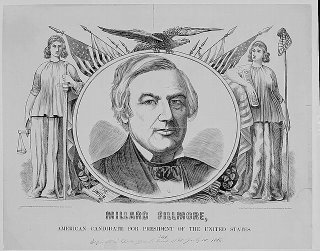A Narrative of the Singular Sufferings of John Fillmore and Others on Board the Noted Pirate Vessel Commanded by Captain Phillips, "With an Account of their daring Enterprise, and happy Escape from the tyranny of the desperate Crew, by capturing their Vessel" is a 23-page, first hand-account by Fillmore of what happened after the dread pirate John Phillips pressed him into service on September 5, 1723, after capturing the fishing sloop he was aboard.

In the fullness of time, John Fillmore would be the great-grandfather of Millard Fillmore. Born in Ipswich, Mass., on March 18, 1702, John Fillmore was the first child of John and Abigail Fillmore and later referred to as the first known American-born Fillmore. He died in 1777, but as a young man barely survived his time with Captain Phillips.
"The pirate soon came up and sent a boat on board our sloop, demanding who we were, and where we were bound," Fillmore wrote of his first encounter with the pirate ship. "To which our Captain gave a direct answer. By this boat's crew we learned that the noted pirate, Captain Phillips, commanded their ship... Having often heard of the cruelties committed by that execrable pirate, made us dread to fall into his hands."
Phillips in fact let the sloop go -- but only after deciding that Fillmore would join his crew as a "good, stout, resolute fellow," forcing him to serve aboard the pirates' ship Revenge. "Those only who have been in similar circumstances can form any adequate idea of the distress I experienced at this time. If I obstinately refused to join the pirates, instant death stared me and my comrades in the face; if I consented to go with them, I expected to be massacred for refusing to sign the piratical articles, which I had fully determined never to do..."
Fillmore did not sign the articles, but was put at the helm of the ship anyway. Captain Phillips had promised to release Fillmore after two months, but of course did not. "Captain Phillips... was not addicted to one particular vice, but to every vice," Fillmore wrote.
The better part of a year passed; the pirates attacked other vessels and pressed other men into service; and Fillmore and others plotted to take the ship from Phillips. Naturally, Phillips got wind of the plot.
"Phillips charged me, as he had done my friend, with contriving to betray him, and take the ship," Fillmore recalled. "The accusation was true enough, but I concluded a lie was warrantable in that case, and consequently replied, that I knew nothing of any conspiracy either against him or his crew. I had prepared to make resistance, in case he offered any abuse; but he had a pistol concealed under his coat, which he presented to my breast, and snapped it, before I had time to make any evasion; but happily for me it missed fire. He drew it back, cocked, and presented it again, but I struck it aside with my hand, so that it went off by my side, without doing any injury.
"I thought of knocking out his brains with the handspike that lay near me, but I knew it would be instant death for me, and therefore concluded if he would leave me, I would not meddle with him at that juncture. He then swung his sword over my head, damned me, and bid me go about my business, adding, that he only did it to try me... The pistol missing fire when snapped at my breast, and then going off by my side, was a strong indication to me that Providence had interposed graciously in my preservation -- that our final deliverance from the barbarity of the savage Phillips, and his abandoned banditti, might be more speedily effected."
And so it was. One morning after the rest of the crew had gotten good and drunk the night before, Fillmore, a man named Cheeseman and a captive referred to as "an Indian" rebelled. Direct action was the only thing to win their freedom: "The Master being busied, I saw Cheeseman make the motion to heave him over, and I at that instant, split the boatswain's head in twain with the broad axe, and dropped him upon the deck to welter in his gore. Before the Captain had time to put himself in a posture of defense, I gave him a stroke with the head of my axe, which partly stunned him; at which time Cheeseman, having dispatched the master overboard, came to my assistance, and gave the Captain a blow with his hammer, on the back side of his head, which put an immediate end to his mortal existence."
Having captured the ship, Fillmore and the others took it into Boston, where three of the surviving pirates were executed (and three others were sent to England for that fate). Fillmore concluded: "The honorable court which condemned the pirates gave me Captain Phillips' gun, silver hilted sword, silver shoe and knee buckles, a curious tobacco box, and two gold rings that the pirate Captain Phillips used to wear."






